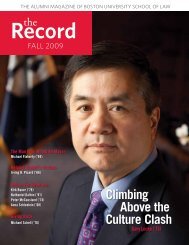the nature of representation: the cherokee right ... - Boston University
the nature of representation: the cherokee right ... - Boston University
the nature of representation: the cherokee right ... - Boston University
Create successful ePaper yourself
Turn your PDF publications into a flip-book with our unique Google optimized e-Paper software.
118 PUBLIC INTEREST LAW JOURNAL [Vol. 15<br />
legitimacy questions, does not logically lead to <strong>the</strong> conclusion that <strong>the</strong> U.S.<br />
government is not bound to <strong>right</strong>s granted in <strong>the</strong> resultant Treaty.<br />
The long standing principle <strong>of</strong> interpreting treaties between <strong>the</strong> U.S. government<br />
and Indian tribes in <strong>the</strong> light most favorable to Indians provides <strong>the</strong> proper<br />
framework for judging <strong>the</strong> delegate <strong>right</strong> contained in <strong>the</strong> New Echota Treaty. 143<br />
The Treaty was and continues to be treated by <strong>the</strong> U.S. government as valid.<br />
Fur<strong>the</strong>rmore, despite protests as to its legitimacy, Cherokees were told that <strong>the</strong><br />
Treaty was unalterable. The <strong>right</strong> to a delegate was not a promise included by<br />
U.S. agents in <strong>the</strong> Treaty in an ad hoc manner, but instead reflects a history <strong>of</strong><br />
similar, though importantly less definitive promises, aimed at Indian<br />
<strong>representation</strong>.<br />
1. Unalterable Treaty<br />
The Preamble <strong>of</strong> <strong>the</strong> Treaty <strong>of</strong> New Echota provides <strong>the</strong> U.S. position that <strong>the</strong><br />
Treaty would be enforced as a legitimate instrument:<br />
And whereas <strong>the</strong> said commissioners did appoint and notify a general council<br />
<strong>of</strong> <strong>the</strong> nation to convene at New Echota on <strong>the</strong> 21 st day <strong>of</strong> December 1835; and<br />
informed <strong>the</strong>m that <strong>the</strong> commissioners would be prepared to make a treaty<br />
with <strong>the</strong> Cherokee people who should assemble <strong>the</strong>re and those who did not<br />
come <strong>the</strong>y should conclude gave <strong>the</strong>ir assent and sanction to whatever should<br />
be transacted at this council and <strong>the</strong> people having met in council according to<br />
said notice. 144<br />
The Preamble reflects Schermerhorn’s sentiments during <strong>the</strong> negotiations, as<br />
recorded in his journal, that “[<strong>the</strong> Cherokees] were also distinctly informed that<br />
those who did not attend would be considered as giving <strong>the</strong>ir sanction to what was<br />
done and transacted by those who did attend.” 145 Not surprisingly, Ross sent<br />
multiple memorials to Congress protesting <strong>the</strong> U.S. position that <strong>the</strong> New Echota<br />
Treaty was sanctioned by <strong>the</strong> Cherokees and that its stipulations were valid. 146<br />
The U.S. government firmly held <strong>the</strong> treaty to be unalterable. According to Ross,<br />
<strong>the</strong> Secretary <strong>of</strong> War “intimated . . . <strong>the</strong> fixed and unalterable determination to<br />
enforce upon us <strong>the</strong> stipulations <strong>of</strong> <strong>the</strong> fraudulent and invalid instrument purporting<br />
example, a Lexis Search yielded 46 citations.<br />
143 See County <strong>of</strong> Oneida v. Oneida Indian Nation, 470 U.S. 226, 247 (1985)<br />
(describing <strong>the</strong> interpretive principle and cannons <strong>of</strong> construction applicable to Indian<br />
treaties).<br />
144 Treaty <strong>of</strong> New Echota, supra note 1, Preamble.<br />
145 A journal <strong>of</strong> <strong>the</strong> proceedings <strong>of</strong> <strong>the</strong> Council held at New Echota, Georgia Dec.21-<br />
30, 1835, with <strong>the</strong> Cherokee people by John F. Schermerhorn, Commissioner on <strong>the</strong> part<br />
<strong>of</strong> <strong>the</strong> United States to treat with <strong>the</strong> Cherokees east, in TREATY WITH THE CHEROKEE<br />
INDIANS, 24th Cong., 1st Sess., 20-27 at 21.<br />
146 See e.g., Memorial from <strong>the</strong> Cherokee Delegation headed by John Ross to <strong>the</strong> U.S.<br />
Senate (Mar. 8, 1836), in 1THE PAPERS OF CHIEF JOHN ROSS, supra note 14, at 412 .









